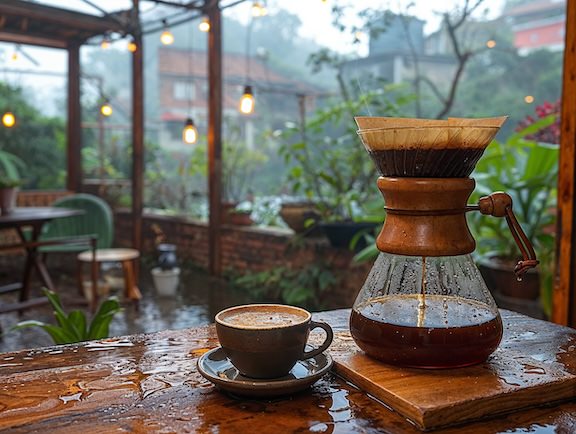Air pressure changes due to weather as well as altitude, can have an affect on the flavor of your coffee in a few notable ways. I’m going to break down how these factors influence coffee brewing and what adjustments you can make to ensure a consistently great cup of coffee under varying conditions.
How Air Pressure Affects Coffee Flavor
The flavor of coffee can be significantly impacted by air pressure, a factor that influences several key aspects of the brewing process. One of the primary ways air pressure affects coffee is through the boiling point of water. In regions of higher altitudes where the air pressure is lower, water reaches its boiling point at a lower temperature. This reduction in temperature can lead to under-extraction of flavors from the coffee grounds, resulting in a brew that might taste weak or lack depth. On the other hand, at lower altitudes or during weather conditions that increase air pressure, water boils at a higher temperature, which can cause over-extraction. This over-extraction can give the coffee a bitter flavor, as more undesirable compounds are pulled from the grounds.
Furthermore, air pressure plays a role in the extraction rate of coffee compounds. At high altitudes, where air pressure is reduced, the extraction process can be slower, necessitating adjustments to brewing methods to achieve a balanced flavor profile. Additionally, the condition of coffee beans and their grind size can be influenced by both air pressure and humidity. In environments with higher humidity or air pressure, such as lower altitudes, coffee beans may absorb moisture from the air. This moisture can affect the size of the grind needed for optimal extraction, as well as the overall condition of the beans themselves, further impacting the taste of the coffee.
Adjustments for Altitude and Weather Changes
To address the challenges posed by varying air pressure and altitude on coffee flavor, several adjustments can be made to the brewing process. For those at high altitudes facing a lower boiling point of water, using water that has just come off the boil for a shorter duration can aid in increasing the extraction of flavors from the coffee grounds. In contrast, at lower altitudes where the water boils at a higher temperature, allowing the boiled water to cool for a minute or two before brewing can help prevent the bitterness associated with over-extraction.
The grind size of the coffee beans is another aspect that may require alteration. A finer grind at higher altitudes can assist in compensating for the reduced extraction rates due to lower boiling points. Meanwhile, a coarser grind may be preferable in lower altitudes or under high-pressure weather conditions to avoid extracting too much and achieving a bitter taste.
Furthermore, tweaking the brew time according to altitude can enhance the quality of the coffee. Longer brewing times may be beneficial at higher altitudes, whereas shorter brewing times could yield better results at lower altitudes. Exploring different brewing methods, particularly those like the French press or pour-over, which offer more control over brewing variables such as temperature and time, can also lead to improved outcomes.
And finally, considering the impact of humidity is essential, especially in terms of bean storage. In humid conditions or areas, it’s vital to store coffee beans in an airtight container to prevent them from absorbing moisture. This precaution helps maintain the beans’ integrity, preventing flavor loss and ensuring they grind effectively.
Understanding these effects and making appropriate adjustments to your brewing process can help you achieve a consistent and delicious cup of coffee, regardless of changes in altitude or weather conditions. Experimentation is key, as the perfect adjustment can vary based on personal taste preferences, specific coffee beans, and the precise conditions you’re dealing with.
Please note that if you purchase from clicking on the link, some will result in my getting a tiny bit of that sale to help keep this site going. If you enjoy my work, perhaps you would consider donating to my daily cup of coffee, thank you.

